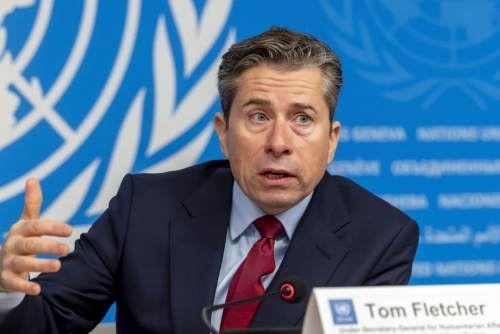UN Relief Chief Calls for Action to
TDT | Manama
Email: mail@newsofbahrain.com
Tom Fletcher, the Under-Secretary-General for Humanitarian Affairs and Emergency Relief Coordinator, has called on the international community to urgently intervene and "break the cycle of violence" in Gaza. In his statement, Fletcher highlighted the devastating humanitarian crisis caused by the ongoing conflict, emphasizing the severe impact on civilians in Gaza and the difficulties faced by humanitarian workers.
Fletcher's remarks came at the conclusion of a week-long visit to the Middle East, during which he met with UN colleagues, humanitarian partners, and local authorities in cities including Damascus, Homs, Aleppo, and Amman. His visit also included a trip to the Occupied Palestinian Territory, where the humanitarian situation has continued to deteriorate rapidly.
Despite the International Court of Justice’s provisional orders issued in January 2024 concerning the application of the Genocide Convention in Gaza, Fletcher noted that violence in the region has intensified, leaving civilians with no safe spaces. Schools, hospitals, and civilian infrastructure have been destroyed, while the population has been subjected to extreme conditions.
North Gaza has been under a near-total siege for over two months, with the threat of famine looming. Meanwhile, South Gaza faces extreme overcrowding, worsening humanitarian conditions as winter approaches. Fletcher pointed to the ongoing Israeli airstrikes on densely populated areas, including areas where Israeli forces have ordered civilians to relocate, exacerbating displacement, death, and destruction.
Despite the dire situation, Fletcher emphasized that Gaza remains one of the most dangerous places for humanitarian workers, with a record number of humanitarians killed this year. These conditions have made it nearly impossible to deliver the necessary aid, with more than 100 requests for access to North Gaza denied since October 6, 2024. Furthermore, Fletcher highlighted the breakdown of law and order, with armed gangs looting humanitarian supplies.
The situation is equally dire in the West Bank, where military operations have destroyed essential infrastructure, resulting in displacement and increasing humanitarian needs. Rising settler violence and home demolitions are compounding the crisis, while movement restrictions limit access to essential services, particularly healthcare.
Despite these challenges, Fletcher emphasized the UN and humanitarian community’s ongoing efforts to provide support and find practical humanitarian solutions. He called on the international community to defend international humanitarian law, demand the protection of all civilians, ensure the release of all hostages held by Hamas, and support the vital work of the United Nations Relief and Works Agency (UNRWA).
Fletcher concluded by paying tribute to the humanitarian workers who continue to risk their lives to provide aid and save lives in these extremely challenging conditions.
Related Posts

